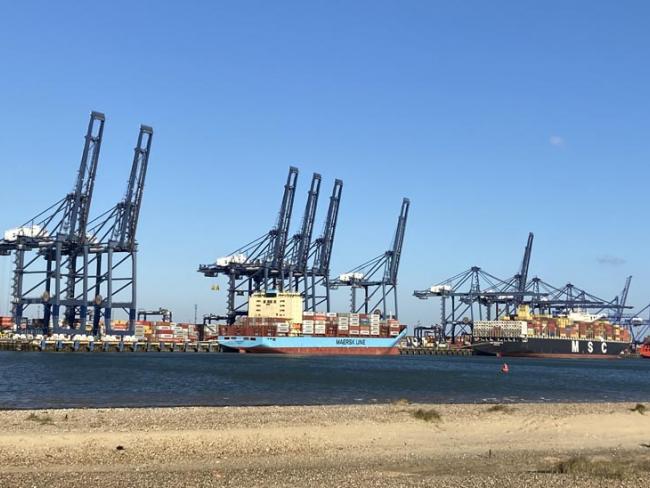
Ships at Felixstowe docks, which handles almost half of Britain’s containerised trade. Photo Workers.
‘Successive governments consistently avoided the question of self-sufficiency through industry…’
A series of reports in the Financial Times in July underlined how British industry suffers when distant capitalist powers go to war over trade. Among the most fought-over commodities in the 21st century are the metals and rare earths needed to manufacture steel and magnets.
The FT claims that political tensions between the US and Asia (mainly, but not solely, China) have led to the stockpiling and weaponisation of critical materials, with consequent financial turbulence as costs soar and dive.
The automotive industry warns of shortages that could force factory closures in Britain and elsewhere. China’s stockpiling of high-purity nickel, and its restrictions on the export of strategic minerals such as rare earths and graphite, have been widely reported.
Indonesia too has put a ban on the export of nickel. Indian automakers have cut production. Mining giant Glencore notes that much of the Congo’s cobalt may remain unsold by 2025 due to export bans. Almost all critical materials are imported into Britain, with inevitable risks to security of supply.
The rising cost of raw materials and the flood of cheap, but hi-tech, Chinese electric vehicles onto the European market threaten companies such as Nissan and Ford. At present jobs at Nissan Sunderland and other car plants in Britain hang by a thread. Sales to both China and the US have declined. Several Ford models have been discontinued and 800 jobs at Bridgend are to go by the end of 2027.
Claims that great progress has been made in the production of electric vehicles look premature. Without the materials, not only the car industry but all manufacturing will grind to a halt. No materials, no production, no work, no growth – no paying off the nation’s mounting debt.
Blame for this must equally be laid at the door of British governments, with their policies of enforced phasing out of petrol and diesel by 2035 and allowing high-grade steel production to move abroad.
Capitalists are not hard-wired to cooperate with each other. However, the FT reports that alarm at the scale of China’s stockpiling has prompted ideas among industrialists of price-setting and a joint buying mechanism to protect profits.
Allies would commit to purchasing materials at certain minimum prices. At the G7 summit in June participants pledged to develop “standards-based markets” for critical materials, seen as a first step to compete with Chinese state support, which has a reputation for keeping prices affordable by ignoring environmental and labour standards.
South African Neal Froneman, founder of loss-making platinum producer Sibanye-Stillwater, pointed out the obvious when he lamented to the FT, “We incur higher costs, and we have higher costs of capital...the model is that it’s a western-world, capitalist system. Shareholders require returns.”
As the FT points out, “the most striking aspect of China’s weaponisation of rare earths is how unprepared western governments and companies were.” Manufacturers “keep only a week’s supply of rare earths in their inventories.”
Beijing has upped the ante, forcing the EU and the US to take measures to boost their own supplies. This has exposed the government as lagging. Britain has negligible amounts of rare earths, but is rich in non-critical basic minerals. If the government were truly interested in Britain’s technological development it would have taken steps long ago to build and retain a metals industry. Instead it has been happy to rely on the US or the EU (themselves ill-equipped), as well as China and Australasia.
China’s domination of materials and supply routes clearly has a knock-on effect on jobs. Workers are rightly wary. But government’s first duty should be towards its own population.
A critical minerals strategy drawn up by the British government as late as 2022 consisted of barely more than a list of chemical elements, with no significant direction as to their use. Little or no support was offered by governments to encourage mining or refining of these minerals.
‘Successive governments consistently avoided the question of self-sufficiency through industry…’
Successive governments consistently avoided the question of self-sufficiency through industry. It came as little surprise that, when the Critical Minerals Intelligence Centre was set up in 2022, led by the British Geological Survey, the primary goal was not developing modern technology but meeting net zero targets.
Modern industry such as the manufacture of quantum computers and supercomputers, not to mention defence and basic infrastructure, came third in importance after recycling.
The Centre points to six industrial sectors dependent on rare earths and other critical minerals, including agriculture, computing, construction and aerospace.
The unpreparedness of Britain, the EU, and the US raises a paradoxical question: are capitalists right to accuse a country of weaponisation of resources by withholding them for their own domestic use? Or – more to the point from a worker’s perspective – should not national governments like ours stand accused of neglect of their own industries, a form of weaponisation against the working class?
A radical revamp of the UK Critical Minerals Strategy is due out in late summer 2025. It may shed more light on the matter. According to the Critical Minerals Intelligence Centre it is intended to be based exclusively on Britain’s particular geopolitical and economic vulnerability. It should confirm that as technology evolves the materials designated as critical are literally the material base of Britain’s economy.
